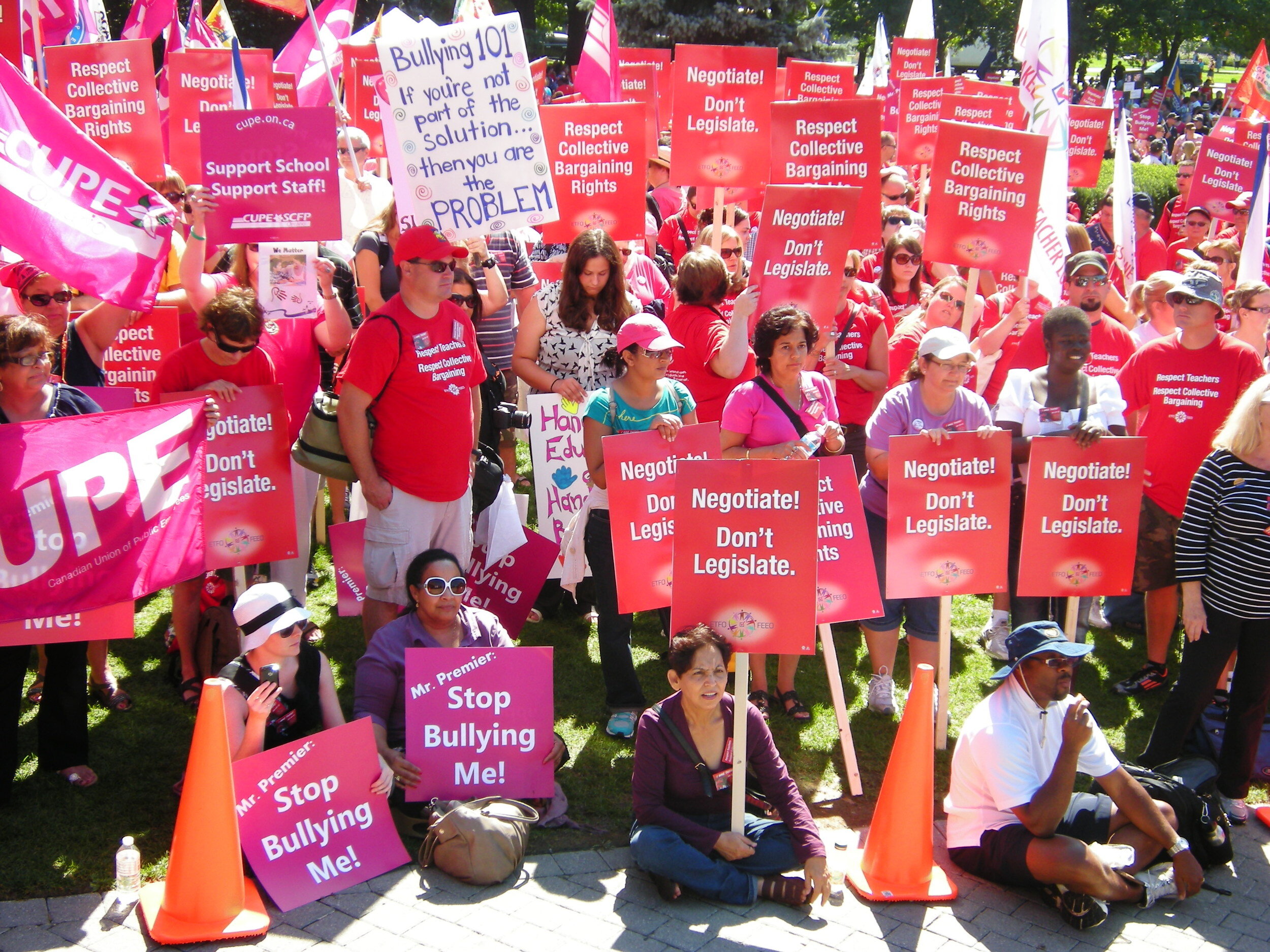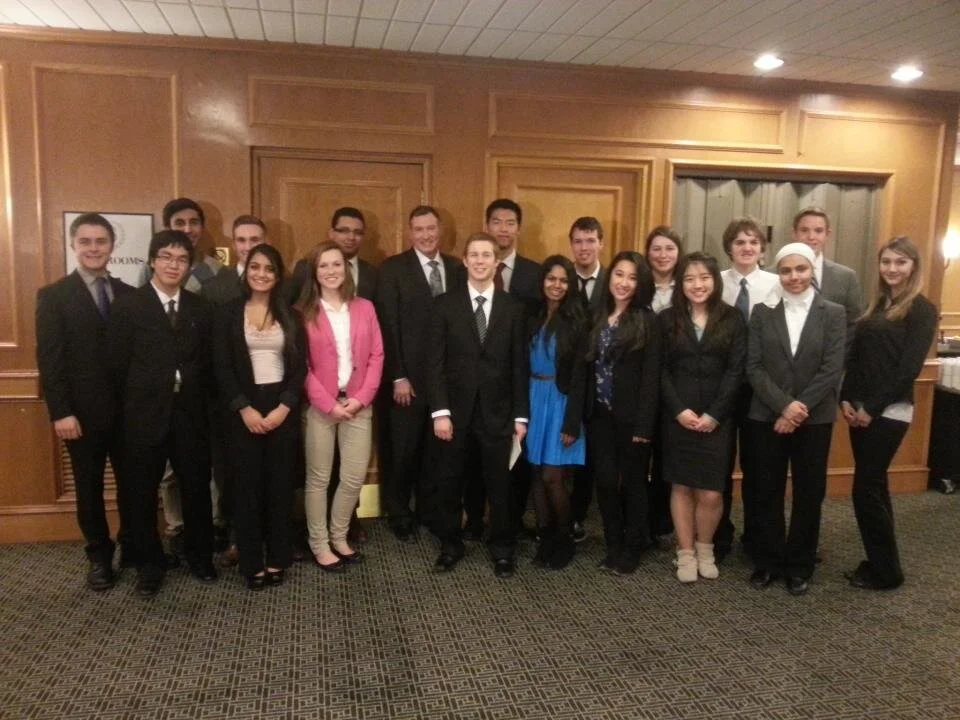
From grassroots beginnings in 2012 to Canada’s largest charity by and for youth.
Our history.
Founded in 2012, the FCSS-FESC has a record of advocating for Canadian secondary students in the public education system.
Since 2012, the FCSS-FESC has grown from a grassroots group of secondary students at Abbey Park High School in Oakville, ON into a registered charity with operations in Alberta, British Columbia, Quebec, Newfoundland and Labrador, and Ontario.
Over the years, we have shifted focus many times, from student advocacy to student support. Today, the FCSS-FESC is focused on giving secondary students the tools to effect change in their local schools and communities with an approach grounded in social justice and mutual aid.
2012
Advocacy on the ground.
The modern day Federation of Canadian Secondary Students / Fédération des élèves du secondaire au Canada (FCSS-FESC) that many students and education stakeholders know today was not our original name or purpose as an organization.
Becoming the FCSS-FESC was a long process of continual evolution and change that continues to this day. We are incredibly proud of our history and roots as, first and foremost, an educational advocacy organization but are excited to begin a new chapter as an organization that provides services directly to students to empower them in their own education.
The Organization for Ontario Secondary Students / L'organisation pour les élèves du secondaire de l'Ontario (OOSS-OESO) was founded in response to the conflict which arose over the implementation of Bill 115 on September 11, 2012. The measures taken in withholding extra-curricular activities and other voluntary teacher actions in particular placed thousands of Ontario students in the middle of the conflict, and lacking the very life and spirit of their academics. Realizing the magnitude of the potential consequences of these effects, nine students at Abbey Park High School in Oakville, Ontario, founded an organization which now stands to empower student proactivity in all related issues.
Leading student protests on Queen’s Park…
The OOSS was a non-partisan organization consisting of students from all over Ontario - from North Bay to Essex County - which endeavoured to provide accurate information to students on the progress and development of the Bill 115 crisis and its repercussions, as well as to empower the student voice across Ontario. In remaining non-partisan, actions taken by the organization were not mandated by external needs and agendas. The OOSS stood purely for the students, and was run solely by student Executives who manage varying sectors within the administrative upkeep and development.
Students could easily reach out to the organization through the close link between the student body and executive or ambassador members, as well as show their support for an effective solution to the current conflict through accessible events, such as the hugely successful Sport Your Extra-Curricular Day. Schools throughout the GTA, and now beyond to as far as Whitby, North Bay and Ottawa, have Ambassadors within their student body who work to implement the OOSS’ campaigns and movements, while relaying concerns and opinions of students to the organization as they arise. They were, and continue to be, the fundamental connection between student and organization, and thus are essential in ensuring students are truly empowered and heard through the OOSS’ efforts.
… and protests in schools.
Since its founding, the OOSS has brought several events to consummation, including a Letter Campaign to the union and government, as well as SYEC Day. Efforts were focused on implementing a new umbrella campaign for future events, which would work to evolve the very nature of “extra”-curricular activities to a “co-curricular” nature. The group was also looking into other possible solutions to resolve this crisis – such as the binding-arbitration procedures used in Manitoba. Each event and campaign with this movement endeavours to raise awareness of the Bill 115 issue at hand and the importance of co-curricular activities, while voicing the opinions and concerns of students in a respectful and organized manner. These efforts have been widely recognized by national media, including newspapers such as the Toronto Star, the Globe and Mail, and on air via CBC’s Metro Morning with Matt Galloway, as well as CBC’s Ontario Today with Kathleen Petty.
On January 16, 2013 the OOSS hosted Sport Your Extra-Curricular Day where students wore their extra curricular clothing or school colours to school in support of the reinstatement of extra curricular activities. This non-partisan event united the student voice in our plea for the return of extracurricular activities.
Taking student voices to decision-makers.
The OOSS has met with officials from both sides of the conflict including Oakville MPP Kevin Flynn, Ontario Education Minister Laurel Broten, and most recently, OSSTF/FEESO President Ken Coran; OOSS members have had ample opportunity to attest firsthand to the effects this issue has had on the quality of education within the current learning community.
Two weeks after Sport Your Extracurricular Day, OOSS Executives met with the president of the Ontario Secondary School Teachers’ Federation (OSSTF), Ken Coran. OOSS Executives met with Mr. Coran at the Sheraton Centre in Toronto to voice student concerns as well as gain a better understanding of the union’s perspective.
Most notably, the OOSS created Operation SOS, which was an open petition on behalf of the students, teachers, parents, and trustees of Ontario pushing for an arbitration similar to ones used in Manitoba, so that another Bill 115 conflict will not come to light again. With nearly 1000 signatories, the petition was sent to politicians and educators alike.
2014
Supporting pathway exploration.
In 2014, the FCSS-FESC dedicated itself to a new direction after the threat of Bill 115 had passed. Across the organization, we reoriented our advocacy into educational programming with the goal of supporting Canadian secondary students in their transition to diverse post-secondary pathways. Be it university, college, the skilled trades, or direct entry in the workforce, our mission was to equip students with reliable and accessible information on all their options.
Even during this significant transition, we retained our focus on Canadian secondary students and their unique needs. Advocacy remained a core part of our programming but the scale was much broader, shifting from one piece of legislation to the education system as a whole. Our students-helping-students approach informed our current mutual aid model which can be seen in all of our programs.
A gathering place for Canadian high school students.
To accompany the national expansion from the OOSS to the FCSS-FESC, we always framed our work in terms of being a central, reliable, and accessible hub of information for Canadian secondary students. As high school comes to a close, many students were not prepared to make the transition to a post-secondary pathway. Through targeted and broad-reaching events, the FCSS-FESC served the needs of Canadian students who wanted information on their post-secondary options, including those beyond traditional university-bound pathways.
2017
Public policy & mental health advocacy.
By 2017, the FCSS-FESC’s vision was to be more than a group of students supporting other students through post-secondary pathway exploration events. Information was important, but necessary changes to support student achievement and well-being in the education system weren’t happening. That’s why the FCSS-FESC phased out some of its legacy programs and less popular events to instead focus on public education policy with an emphasis on mental health.
This third transformation is what drove us to become a charitable organization to truly deliver on our students-helping-students model. As the organization pivoted towards education policy work, it inspired us to draft a national education standard that summarized the rights that every secondary student should be able to expect in their interactions with schools, school boards, and the education system as a whole.
From SBOR to CCLR.
During the third transformation of the FCSS-FESC, we launched the Student Bill of Rights (SBOR). Today, it is known as the Canadian Charter of Learners’ Rights (CCLR). Despite the name change, the content and commitment to delivering a better state of education policy was always the same. CCLR summarizes six key rights that we believe are fundamental to healthy, safe, inclusive, and well-functioning schools, school boards, and Ministries of Education. These include:
Fundamental Rights;
Accessibility Rights;
Equality Rights;
Fair Assessment Standards;
Utility Rights; and
Digital Rights
2021
Advancing social justice in schools.
Beginning in 2021-2022, the FCSS-FESC entered its fourth transformation as an organization. We worked to re-centre the voices of traditionally marginalized and underrepresented students with a focus on Indigenous students, 2SLGBTQ+ students, Black and racialized students, women, and students with disabilities. In this fourth transformation, our programs and services that we offer changed as well, moving from high-level public policy change to grassroots-level advancement of social justice in individual schools, school boards, and local communities.
Today, our mission is to create long lasting and impactful change, one school at a time. We leverage the local knowledge of individual students and give them the tools, knowledge, resources, and mentorship to create safer schools that are more equitable and inclusive. Each of our programs works to advance Indigenous reconciliation, combat anti-Black and anti-Asian racism, or to support greater inclusion for 2SLGBTQ+ students.




